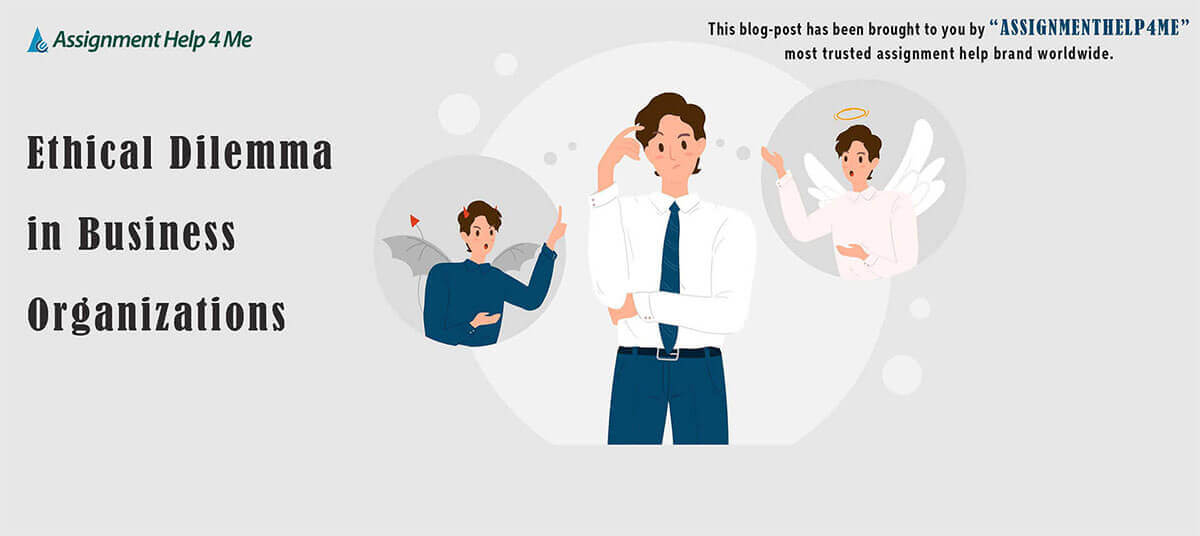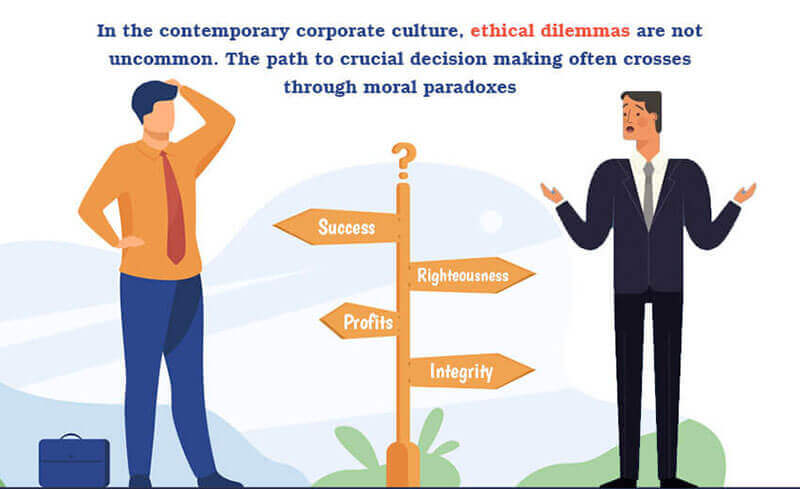

Contents
A take on Ethical Dilemma in Organizations
Isabelle Taylor | 06 Mar,2021
What is Ethical Dilemma?
Also known as an ethical paradox or moral dilemma, an ethical dilemma is a situation where an individual faces two conflicting moral requirements or choices to choose from. In such an ethical dilemma, none of the two moral choices override each other. Another common definition used for an ethical dilemma is of a situation where every available choice is a wrong one and there is no correct course of action. Usually, an ethical dilemma involves decision-making around difficult choices by nature and neither of the available choices is consistent with the accepted ethical guidelines. Such is the course of human life that it is not uncommon for an individual to frequently face ethical dilemmas and these morally difficult situations can occur in any imaginable domain including personal relationships, professional life, while interacting with the members of society, while grooming children and so on.

As mentioned above, an absolute right or choice is absent in an ethical dilemma and this means that individuals in an ethical dilemma are required to rely on morals and values to navigate through such situations. Furthermore, the sources or reasons for ethical dilemma can be varying as these situations may arise out of the failure of personal character, conflict of an individual’s values, and the demands of a situation. Ethical dilemmas may also arise due to conflict of personal interest in situations where one is needed to exhibit professionalism. Precisely, for a situation to be considered an ethical dilemma, there needs to be a requirement to make decisions as uncontrollable situations cannot be considered as ethical dilemmas. In addition to this, there also needs to be a conflict of personal values and morals in either of the decisions for a situation to tantamount to an ethical dilemma. This means that in a situation of ethical paradox, one must be required to make a distinction between ethics, values, morals, moral incorrectness, and policies while reaching a decision.
Types of Ethical Dilemma
Moving further, ethical dilemmas can be further classified into two categories i.e.- Absolute Dilemma and Approximate Dilemma. Following is a detailed overview of the ethical dilemma that individuals often find themselves in
Absolute Dilemma:
An absolute ethical dilemma is a term that refers to a situation when two or more ethical standards apply to a situation but the applicable ethical standards are in conflict with each other. These types of ethical dilemmas involve the most difficult decision making and for overcoming this type of dilemma, one might be required to refer to codes of ethical standards. In fact, such situations can become one of the predominant causes of stress and anxiety.
Approximate Dilemma:
The second type of ethical dilemma is an approximate dilemma that involves difficult situations that require a decision while also requiring conflicts between values, laws, and morals. In this type of situation, one might be required to distinguish between personal and professional dimensions of decision making.
While ethical dilemmas are not uncommon in different types of situations, with the kind of decision-making requirements that are involved in business activities, facing an ethical dilemma in business organizations is particularly common.
Ethical Dilemma in Organizations
In the realms of corporate culture and business organizations, the existence of ethical dilemmas of different types is not uncommon. This can be attributed to a high level of decision-making that is involved in handling day-to-day business activities such as website optimization, monitoring as well as driving major organizational changes. In the context of business organizations, an ethical dilemma can be defined as a complex situation at the workplace that managers or employees have to face, leading to a conflict of moral imperatives. In business organizations, usually, a large number of different types of individuals collaborate to work and contribute towards organizational goals. Most of the time, these individuals have a different set of interests and distinctive personalities driven by distinguishable morals and personal choices. As people have different sets of personal and moral values, they are also likely to be comfortable with different types of ethical standards. However, this can give rise to the chances of conflict of moral leaning amongst different individuals working in the organization and this, in turn, leads to cases of ethical dilemma where tough decisions are required to be made.

For managers, situations of ethical dilemmas can be particularly difficult considering that they have to consider the interest of the employees, the interest of the business organization as well as their own personal and moral values. While ethical dilemmas are prevalent in business organizations by nature, there are still some factors that can be considered to be driving forces towards ethical dilemmas.
Following are the factors that contribute to Ethical Dilemmas in Business Organizations:
- Firstly, unethical decision-making by the top executives and management of the organization is a factor that can trigger situations of an ethical dilemma. Unethical actions or unethical decision-making by the management and leadership group may come in the form of favoring a particular set of employees, promoting their self-interest, performing insider dealing, or accepting lavish gifts from potential suppliers.
- Moving further, the next key factor in situations like these can be a toxic culture at the workplace. Further, toxic workplace culture may be perpetuated by hiring culturally unfit employees who engage in exhibiting discriminatory and biased behavior in the organization with subordinates and colleagues. Not only this, but toxic workplace culture might also incite the employees of a given organization to make unethical decisions or to be involved in activities that are not acceptable on professional grounds.
- Moving on to the next factor, unrealistic and conflicting goals set by the management of the organization without considering the interests of the employees and business partners can be another contributing scenario behind cases of ethical dilemmas. Unrealistic goals and objectives assigned to the workers of the company might prompt employees to ignore moral standards and take questionable decisions on ethical grounds. Henceforth, it is clear that ethical dilemmas in business organizations in the modern world are common and there are many different factors to which this can be attributed to.
Probing further, the impact of not tackling cases of an ethical dilemma is not only limited to the subjects involved in the situation but also reach out to the entire organization. This is the reason why making sure that ethical standards are used optimally is increasingly imperative for avoiding conflicts and stressful issues in an organization.
Examples of Ethical Dilemma in Organizations
It is clear that the ethical dilemma in business organizations is a very real issue and it is difficult to imagine an organization that does not have to deal with such testing ethical paradoxes. Ethical dilemmas in business organizations can be better understood with the use of different examples. Accordingly, given below are examples of ethical dilemma in organizations:
Example 1: Employees forced into unethical practice due to Management Pressure
The first example of an ethical dilemma is of moral conflict that employees have to face while dealing with pressure from the management. For example, the management of a company may aggressively steer its employee and managers towards the use of a misleading form of accounting. This could be done to greatly inflate the profits of the company and to mislead market analysts and shareholders. The misleading accounting reports can be used by the management for deceiving the public and shareholders about the financial performance of the company and this is clearly of personal interest for the management. But in this case, it is the employees who will be facing the ethical dilemma as they would be pressurized by their bosses to be involved in unfair and unethical business practices, and refusal to do so might even lead to employees losing their job creating a sense of negativity in the organizational behavior. Consequently, this is a situation of ethical dilemma in the organization as employees will be needed to choose between keeping their job or being involved in unfair business practices along with the management. This is a situation involving an ethical dilemma as the employees would be required to make a tough decision from the viewpoint of their moralities. For making a decision in this kind of situation, the employees of the organization can refer to the theory of Deontological Ethics. The idea behind this theory of ethics is that human beings should be treated with dignity and respect without any form of discrimination because they all have equal rights. Employees should consider their right to refuse to be a part of illegal and unethical activities and collectively refuse the instructions of the management.
Example 2: Dilemma for an Employee regarding reporting a breach of organizational policies by their friend
Another example of an ethical dilemma for an employee of the organization can be deciding between whether or not to report inappropriate behavior of a colleague. For instance, an employee might be friends with a coworker who has recently been rude to clients while also using racial slurs and indulging in racism. The employee who knows about these incidents also knows that it is important to report the behavior of their friend. But the situation is not straightforward considering that reporting the behavior of the employee will invite action against them and might even lead to their friend losing their job. There is also going to be a very clear impact on their friendship. All these factors make this decision difficult for the employee and hence instigate the situation of an ethical dilemma. In this ethical dilemma, the employee is required to choose between their friendship and his ethical obligation to the organization that they are working for. This is a perfect example of an ethical dilemma considering that none of the decisions can be considered right or wrong. Also, regardless of the decision taken, the personal value and morals of the employee will be compromised. For overcoming this situation, utilitarian ethics theory can be applied in this case and this theory utilizes the concept of ‘the greatest good for the greatest number’. This implies that the right decision, in this case, would be reporting the friend’s behavior to the management as this would mean greater good for a greater number of people (customers) even if it means acting against the defaulter employee.
Example 3: Reporting discriminatory behavior of a Supportive senior against other employees
One more example of an ethical dilemma would be Reporting discriminatory behavior of a Supportive senior against other employees. For instance, an employee (A) has a highly supportive senior supervisor (B) who is always exhibiting favorable behavior towards him and both of them have a healthy working relationship. (A) has found that (B) has been exhibiting discriminatory behavior against his other fellow employees. (A) is now in an ethical dilemma regarding whether or not he should report (B)’s behavior to the management. Reporting the behavior will mean that their work relationship will be jeopardized but it will also mean that discriminatory behavior in the organization will cease to exist. In such a case, the theory of Virtue Ethics can be applied for decision making. This theory requires the subject to consider the virtues that are good for public relations. In this case, the truth can be considered to be the most important virtue, and accordingly, the decision to report the behavior to the management should be taken.
Example 4: Whether or not to Report a minor data breach in the organization if it helps avoid the consequences to the business and the employees
A small IT business has recently discovered that their database servers faced a minor data breach where the hackers were able to obtain information regarding the last name of their customers. By law, the organization will be required to report the data breach to government security agencies but it would mean that they will have to pay hefty fines. Due to this, the business and the employees will also have to face severe financial consequences. Here, the organization is in an ethical dilemma regarding whether they should comply with the law or simply look after their financial interests. Utilitarian ethics theory can be applied in this situation and according to this theory, not reporting the breach will be the greater good for the many employees of the company and hence should be chosen as the path to take.
Ways to Tackle Organizational Dilemma
The aforementioned examples can be used to obtain an understanding of ethical dilemmas or ethical paradoxes in the context of business organizations. The difficulty that ethical dilemmas pose to the members of a business organization is also evident from the examples given above. The above analysis leaves no doubt that tackling organizational ethical dilemmas effectively is crucial when it comes to avoiding conflicts and ensuring ethical conduct of the workforce. Furthermore, different strategies can be used when it comes to tackling organizational ethical dilemmas.
Talking about the resolves, the strategies to tackle ethical dilemmas in the organization can be categorized into three categories i.e.- Organizational, Employees, and Government:
Organizational Strategies:
First of all, the development of trust in an organization can be an important and effective strategy for building an organizational structure that can facilitate effective dealing with an organizational ethical dilemma. Trust can be seen as the social glue for any organization and society as a whole and trust is used for enabling productivity, collaboration, and cooperation in an organization. While the development of trust in an organization can be a complex matter, this can be seen as an effective tool of management that also involves dealing with or preventing instances of an ethical dilemma. When there is a high level of trust amongst the workers and in a worker-management relationship in the organization, there can be better alignment of personal values and morals for different members of the organization, leading to fewer chances of an ethical dilemma.
In addition, another key strategy that can be used for preventing the chances of ethical misconduct and ethical dilemma in an organization is the alignment of personal interests of the employees with the strategic objectives of the organization. A common cause of ethical dilemma in business organizations is that often the personal interests of the employees do not align with the interests of the management and organization as a whole. Making efforts to address the gap between personal goals and the organization’s strategic objectives can be the key to tackling organizational dilemmas. In this way, employees will not be required to compromise their values to further the interest of the organization. While the aforementioned two strategies can be useful when it comes to avoiding the chances of ethical dilemmas in an organization, for better dealing with the inevitable ethical dilemmas, more sets of strategies are required.
Employee Oriented Strategies:
For dealing with inevitable ethical dilemmas, the employees should refer to a common agreed-upon code of ethical conduct. There should be a single ethical framework that is relevant to the organization’s business functions. For instance, IT organizations can choose the ACS code of ethics as their reference code of ethics framework. In cases of ethical dilemma, the employees, as well as the management, should refer to this framework for making the major decisions. Along with providing a basis for tackling ethical dilemmas, this will also help in promoting consistency in decision-making for the employees as well as members of management in the organization. In this way, a mix of these strategies combined with an emphasis on ethical conduct at all times can be significant to preventing as well as effectively tackling the situations involving ethical dilemmas.
Government Oriented Strategies:
Discriminatory behavior can be considered to be one of the most common factors behind Ethical Dilemmas in business organizations. Government-oriented strategies can play an active role in averting these ethical dilemmas. The government can implement strict policies and procedures against the involvement of discriminatory behavior of any kind in organizational decision-making and operations. Under these policies, reporting discriminatory and ethical behavior to relevant government authorities should be mandatory. Accordingly, governments will work with relevant government authorities to curb discriminatory and unethical behavior based on caste, creed, religion, sexuality, and any other factor.
So, as it is evident, a collective response spanning responses from the government, revamped policies of the organizations, and uniformity of conduct among workers is essential to combat ethical paradoxes. If unaddressed, these peculiar issues can negatively affect the performance of the organization, the ideal virtues of high employee engagement and commitment of employees.
